
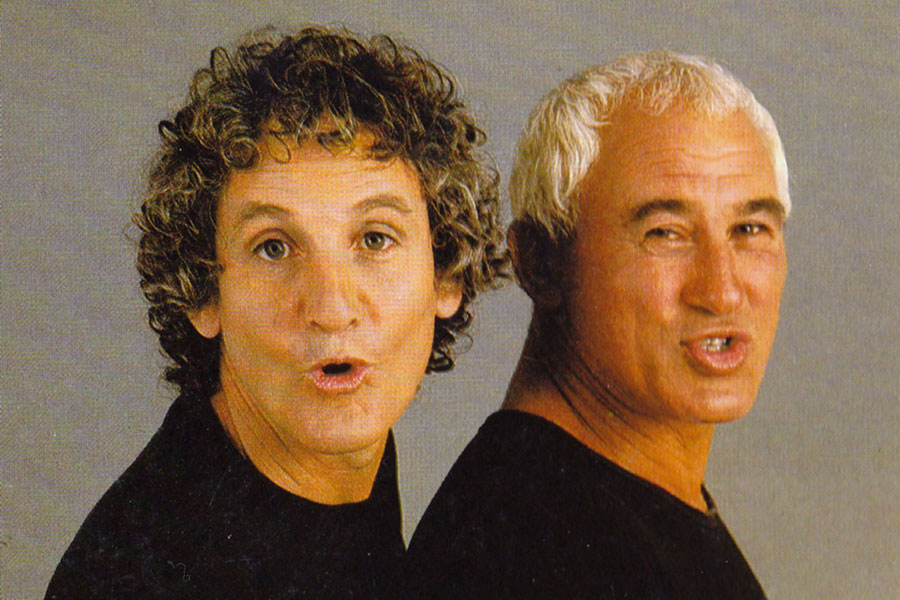
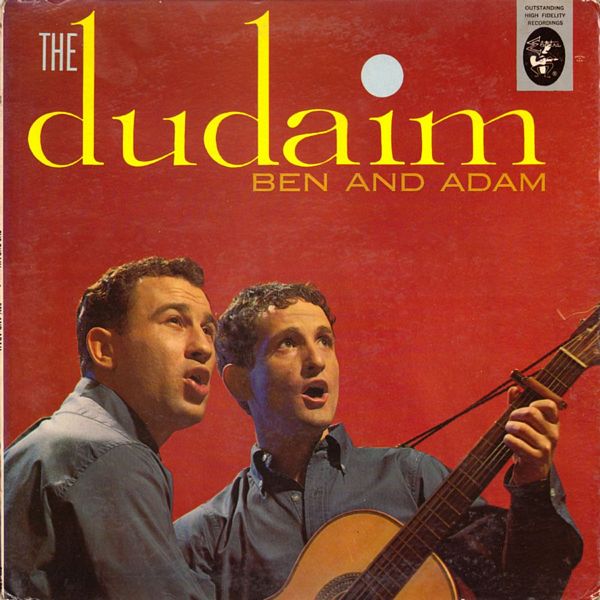 |
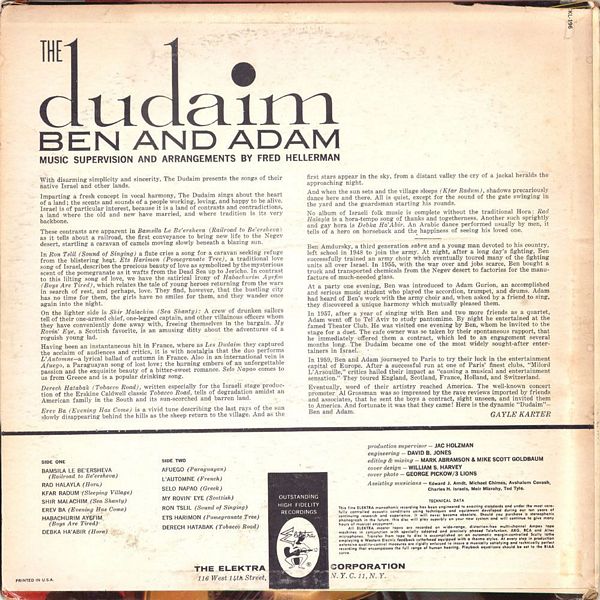
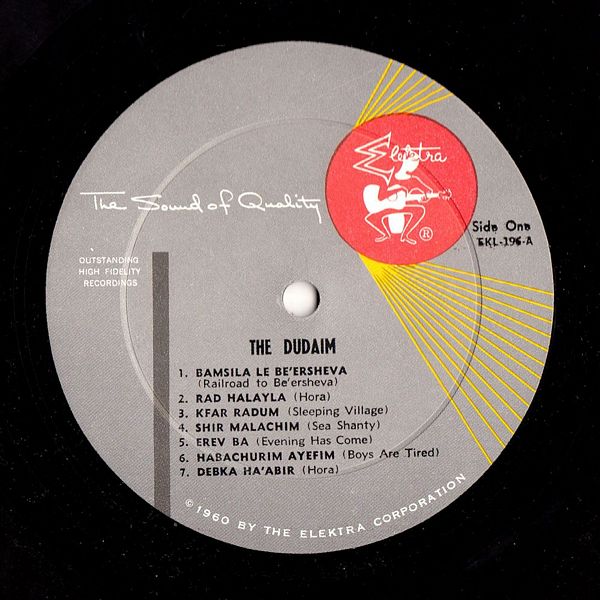
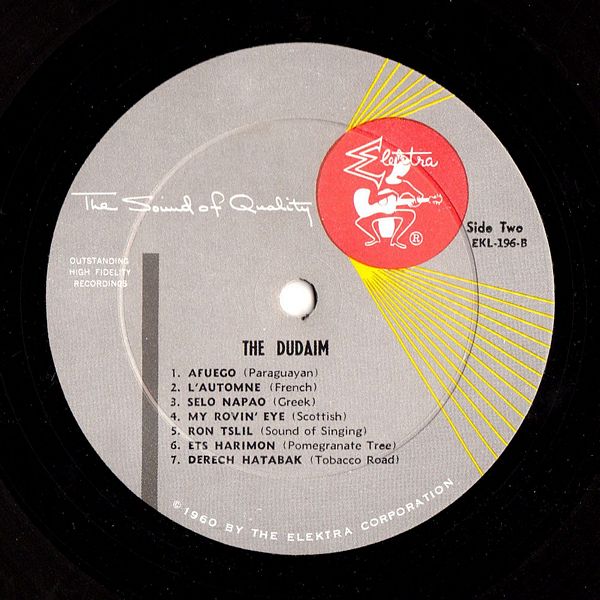 |
Sleeve Notes
With disarming simplicity and sincerity, The Dudaim presents the songs of their native Israel and other lands. Imparting a fresh concept in vocal harmony, The Dudaim sings about the heart of a land; the scents and sounds of a people working, loving, and happy to be alive. Israel is of particular interest, because it is a land of contrasts and contradictions, a land where the old and new have married, and where tradition is its very backbone.
These contrasts are apparent in Bamsila Le Be'ersheva (Railroad to Be'ersheva) as it tells about a railroad, the first conveyance to bring new life to the Negev desert, startling a caravan of camels moving slowly beneath a blazing sun.
In Ron Tslil (Sound of Singing) a flute cries a song for a caravan seeking refuge from the blistering heat. Ets Harimon (Pomegranate Tree), a traditional love song of Israel, describes the precious beauty of love as symbolized by the mysterious scent of the pomegranate as it wafts from the Dead Sea up to Jericho. In contrast to this lilting song of love, we have the satirical irony of Habachurim Ayefim (Boys Are Tired), which relates the tale of young heroes returning from the wars in search of rest, and perhaps, love. They find, however, that the bustling city has no time for them, the girls have no smiles for them, and they wander once again into the night.
On the lighter side is Shir Malachim (Sea Shanty): A crew of drunken sailors tell of their one-armed chief, one-legged captain, and other villainous officers whom they have conveniently done away with, freeing themselves in the bargain. My Rovin' Eye, a Scottish favorite, is an amusing ditty about the adventures of a roguish young lad.
Having been an instantaneous hit in France, where as Les Dudaim they captured the acclaim of audiences and critics, it is with nostalgia that the duo performs L'Automne — a lyrical ballad of autumn in France. Also in an international vein is Afuego, a Paraguayan song of lost love; the burning embers of an unforgettable passion and the exquisite beauty of a bitter-sweet romance. Selo Napao comes to us from Greece and is a popular drinking song.
Derech Hatabak (Tobacco Road), written especially for the Israeli stage production of the Erskine Caldwell classic Tobacco Road, tells of degradation amidst an American family in the South and its sun-scorched and barren land.
Erev Ba (Evening Has Come) is a vivid tune describing the last rays of the sun slowly disappearing behind the hills as the sheep return to the village. And as the first stars appear in the sky, from a distant valley the cry of a jackal heralds the approaching night.
And when the sun sets and the village sleeps (Kfar Radum), shadows precariously dance here and there. All is quiet, except for the sound of the gate swinging in the yard and the guardsman starting his rounds.
No album of Israeli folk music is complete without the traditional Hora: Rad Halayla is a hora-tempo song of thanks and togetherness. Another such sprightly and gay hora is Debka Ha'Abir. An Arabic dance performed usually by men, it tells of a hero on horseback and the happiness of seeing his loved one.
Ben Amdursky, a third generation sabra and a young man devoted to his country, left school in 1948 to join the army. At night, after a long day's fighting, Ben successfully trained an army choir which eventually toured many of the fighting units all over Israel. In 1955, with the war over and jobs scarce, Ben bought a truck and transported chemicals from the Negev desert to factories for the manufacture of much-needed glass.
At a party one evening, Ben was introduced to Adam Gurion, an accomplished and serious music student who played the accordion, trumpet, and drums. Adam had heard of Ben's work with the army choir and, when asked by a friend to sing, they discovered a unique harmony which mutually pleased them.
In 1957, after a year of singing with Ben and two more friends as a quartet, Adam went off to Tel Aviv to study pantomime. By night he entertained at the famed Theater Club. He was visited one evening by Ben, whom he invited to the stage for a duet. The cafe owner was so taken by their spontaneous rapport, that he immediately offered them a contract, which led to an engagement several months long. The Dudaim became one of the most widely sought-after entertainers in Israel.
In 1959, Ben and Adam journeyed to Paris to try their luck in the entertainment capital of Europe. After a successful run at one of Paris' finest clubs, "Milord L'Arsouille," critics hailed their impact as "causing a musical and entertainment sensation." They toured England, Scotland, France, Holland, and Switzerland.
Eventually, word of their artistry reached America. The well-known concert promoter Al Grossman was so impressed by the rave reviews imported by friends and associates, that he sent the boys a contract, sight unseen, and invited them to America. And fortunate it was that they came! Here is the dynamic "Dudaim" — Ben and Adam.
GAYLE KARTER